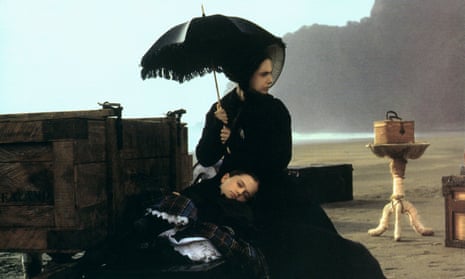The re-release of Jane Campion’s mysterious film The Piano after 25 years is a chance to taste again its fetishism and voyeurism, its strange story of sexuality denied and displaced. It is also about the gravitational pull of death; Campion quotes Thomas Hood’s 1827 poem Silence at the very end of the credits: “There is a silence where hath been no sound, / There is a silence where no sound may be, / In the cold grave – under the deep deep sea.” (Perhaps she was savouring the fact that these words would be shown to near-emptied cinemas.)
I once found something over-literary in this film. I felt it played like an adaptation of some forgotten 800-page Booker-shortlisted novel (it is actually from an original screenplay by Campion). And for what it is worth, I believe Campion’s masterpiece is her less well known Bright Star, from 2009, with Ben Whishaw as John Keats. But a second viewing of The Piano allowed me to see how unique it is. And yes, there are literary qualities: it has echoes of Angela Carter and Peter Carey, but these only add to its intelligence and distinction. And there is a fierce performance from Holly Hunter, whose face radiates intensity and enigma.
Maybe, above everything else, a re-evaluation of The Piano is about seeing how little of its backstory should be taken at face value. Hunter plays Ada, a 19th-century Scottish woman who has agreed to make the arduous journey to New Zealand to marry a colonist there: Alisdair Stewart, played by the reliably excellent Sam Neill. Ada has brought along her infant daughter Flora (Anna Paquin), and among the possessions that have to be brought on to the beach by near-mutinous Māori servants when she arrives is a baby grand piano. Ada is mute; she uses sign language and writes notes – largely indignant orders and complaints – from a little pad and pencil strung around her neck. Her piano is a vital form of self-expression. Everything about Ada deeply disconcerts Alisdair, who declares that his servants cannot possibly transport this piano to their plantation.
This is where his Scottish factotum comes in: Baines, played by Harvey Keitel, a man who affects Māori face markings and has, as they used to say, “gone native”. “Gone indigenous” doesn’t really convey the same imperialist flavour. Baines takes it upon himself to rescue the piano. He takes it to his own hut and asks Alisdair if he will consent to Ada giving him “lessons”. Bemused, trusting, glad of any way of appeasing his strange and angry bride, Alisdair agrees. In fact, Baines wants to watch her play, while in a state of progressive undress. His sexual obsession with her is soon requited, but the piano itself becomes a fetish, an occult symbol, generating the music of their secret love.
So who is the father of Flora? Mother and daughter have a poignant consolatory fantasy about this man having been a German composer. It could be that Ada’s single-mother status was due to having once been respectably married and then widowed, and Ada does wear mourning black. This is what Alisdair believes, or wants to believe, knowing that, in the marriage market, he has little to offer but hardship. He may also assume Ada’s situation means she cannot afford to be squeamish about work and conjugal duties. But it is at least as possible that Ada has been raped – her own father’s culpability is not out of the question – and that her inability to speak is due to this. She says she lost her speech when she was six (roughly the age Flora is now) but that may not be true. We just have to ponder what has happened. The pain, and the grim determination with which the pain has been suppressed, give a force to the film.
There are many extraordinary images: the piano itself, surreally marooned on the beach, is emblematic of the European imperial adventure. The amateur performance of Bluebeard by the white incomers, disrupted by its audience, is a bizarre and ominous episode. Ada’s final fainting in the mud and rain, her stark black dress ballooning up around her, makes her look like some dying sea monster, or a squid squirting out ink, or a ghost. Her love scenes with Baines are gamey and strange but also sensuous and moving. The fact that Baines’s nakedness is revealed to us well before Ada’s shows how unusual its depiction of sex is compared to most films, then as now. And Hunter’s performance is outstanding. So is the film.







